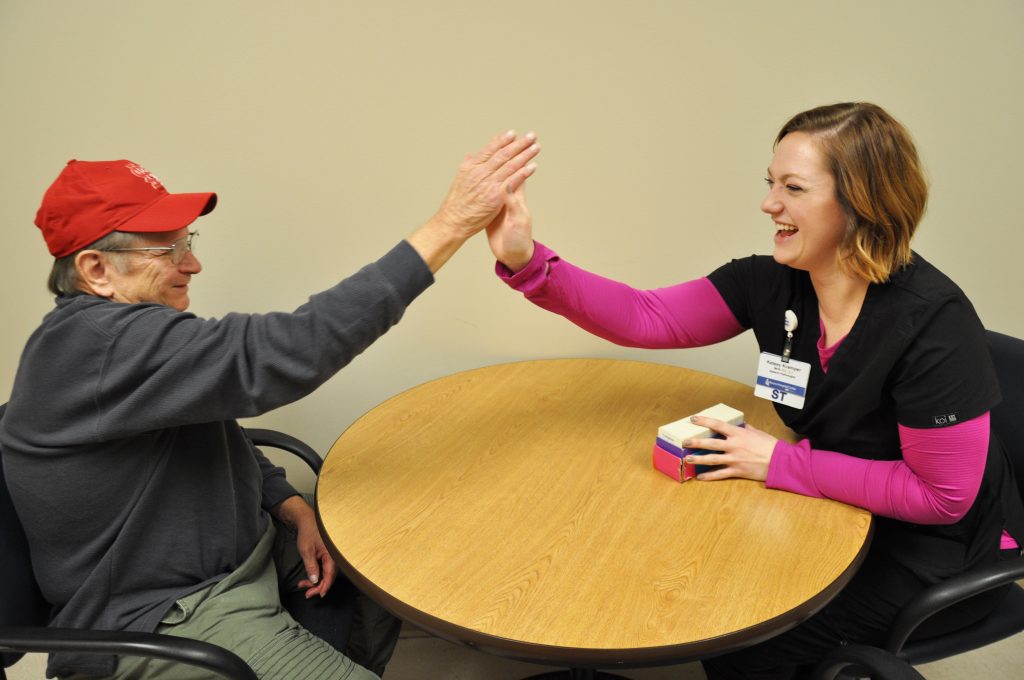
Finding the Words
By Madison Loethen
When 63-year-old Tim Salisbury opened his eyes on September 14, he quickly realized he was in a hospital bed but wasn’t immediately sure why he was there.
The day before he had been on the phone when he started having trouble speaking. His arm felt numb and his fingers were tingly. Tim told his wife he was going to go lay down, but not long after, she came in and said he didn’t look good and they needed to go to Boone Hospital Center.
The rest of the day is mostly a blur, but Tim recalls being in the Emergency Department, a MRI and a CAT scan. The next morning, Tim opened his mouth to speak.
“I’m okay,” Tim wanted to say, but nothing came out. He tried several more times to speak, but all he could say was his name. It was then that Tim learned he had suffered a stroke.
Tim’s stroke had impacted his ability to produce language and his ability to formulate specific speech sounds. These deficits are known as expressive aphasia and apraxia of speech. Tim was also exhibiting neurogenic stuttering, which can sometimes result from a stroke.
In addition to his speech difficulties, Tim had weakness in his arms and legs, decreased coordination, difficulties performing activities of daily living, double vision and difficulty walking due to poor balance.
While in the hospital, Tim was seen by Boone Hospital’s physical, occupational and speech therapists to begin working on the various deficits resulting from his stroke. Tim was in the hospital for 5 days and received visits from his team of therapists daily. When it was time for discharge, Tim was referred to Boone Therapy, Boone Hospital’s outpatient therapy program to continue to work on his recovery.
Tim had an appointment with speech therapist Kelsey Kramper, ST, just days after leaving the hospital. Before Tim arrived, Kelsey had the opportunity to review Tim’s history from his recent stay at Boone Hospital and determine which evaluations she would need to perform in order to assess Tim’s current abilities. In his first session, Kelsey completed the assessments of Tim’s speech and language. Together they developed a plan of care to start addressing the areas most impacted by his stroke.
Tim attended his speech therapy sessions 2 to 3 times a week, for an hour at a time. They worked on a variety of techniques to assist Tim with his communication needs. They did drills to address placement of Tim’s tongue, lips and teeth in order to produce the specific sounds Tim needed to speak. They also did activities to help Tim retrieve the words he needed to express his wants and needs in a way that family and friends could understand. Kelsey taught Tim relaxation techniques to reduce the tension he was demonstrating while trying to speak. Tim rapidly began to show improvement.
“When Tim first started coming to me, he could only say a few phrases and had long pauses in between thoughts. I could tell it was really frustrating for him. We started therapies that helped him find the words he wanted to say. One of the ways we did this was through divergent naming. For example, I would ask him to name four things that are round, and he would have to name four things,” says Kelsey.
As Tim progressed in therapy, Kelsey began introducing more difficult tasks. One activity that Tim enjoyed was the game Taboo.
“The game helped him with his word-finding skills. It’s a fun, more advanced therapy that helps Tim form multiple sentences in conversation. Taboo helps bridge the gap between drills and conversational speech, and he is getting pretty good at it,” says Kelsey. Tim’s family even purchased the game as a Christmas gift, so they can practice with him at home.
“At first, I could hardly say anything, but with Kelsey’s help, I was able to get my speech back. I am actually able to say what I am wanting to say,” says Tim.
Tim loves to laugh and enjoys telling a good joke now and then. He says one of the best parts of his speech improving is being able to express his sense of humor.
“When I had to talk real slow and think real hard, I wasn’t able to have fun and crack jokes. I feel like I’m able to be myself again,” says Tim.
Every week Tim has shown dramatic improvement. Tim’s speech is now almost back to normal and he is about to graduate from speech therapy. Tim completed his work with Physical and Occupational Therapy last fall.
“I’m glad I’m doing better, but I’m going to really miss Kelsey. I’m just going to have to come back and say hi sometimes,” says Tim.
For more information about Boone Therapy’s speech, occupational or physical therapy services, visit boone.org/therapy or call 573.815.3868.